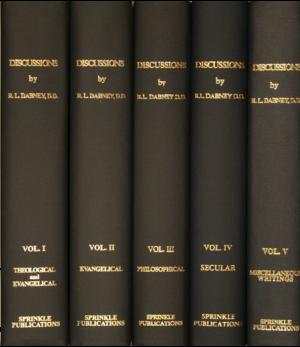
The great Southern Presbyterian theologian Robert Lewis Dabney has been mentioned a number of times on this site. It is a very telling indication of our times that such a visionary man is so little known, and usually slandered when mentioned at all. You can find the entire collection of his written works at the Dabney Archive, all of which are well worth reading. However, such a massive undertaking can be a bit overwhelming, and so on Sundays I have begun posting bite-sized excerpts from Dabney’s works with perhaps a little bit of my own commentary. This will be done in hopes of promoting wider readership for this great man. You can find links to all the previous “Dabney on Sunday” posts at the bottom of this post.
The following excerpt is taken from an article Dabney wrote for the Presbyterial Critic, published in July 1855 and entitled “The Gospel Idea of Preaching.”
These principles cut up by the roots the whole fashion of “preaching up the times,” as it was quaintly called by our Scots forefathers. If the preacher’s business is the redemption of the soul, and his instrument is the Bible truth, it is plain that he has no business in the pulpit with Nebraska bills, Abolitionism, politics, Eastern questions, and all the farrago of subjects with which infidel ministers of Christianity essay to eke out, as they pose, the deficient interest and power of the message of salvation. The preacher’s business in the pulpit is to make Christians, and not to make free-soilers, Maine-law-men, statesmen, historians, or social philosophers. His message from the pulpit is that which God has put into his mouth, and nothing else. The question may be asked: “Are Bible principles never to be applied, then, to the correction of the social evils of the day by those who are the appointed expounders of the Bible?” So as God so applies them in the Bible, yes; but no farther. Let the preacher take the application of the principles, as well as the principles applied, from the word of God; let him take, not only his starting position but his whole topics, from God’s word, and he will be in no danger of incurring that sarcasm, as biting as it is just, directed against those who “take their texts from the Bible, and their sermons from the newspapers.” Many preachers seem to think that if it is a scriptural principle which they use, it matters not how unscriptural or extra-scriptural is the use which they make of it. They forget that it does not follow, because a man has drawn his weapon from the king’s armory, that therefore he is fighting the king’s battle; soldiers have sometimes used the sovereign’s arms to fight duels with each other. It may be asked again: “Is the preacher to forego and disuse all that influence for social good which his Christian intelligence gives him? Has he ceased to be a citizen and a patriot because he has become a minister?” No. But when he appears in the pulpit he appears not as a citizen but as God’s herald. Here is a very simple and obvious distinction much neglected. The other channels of patriotic influence are open to him which other citizens use, so far as he may use them without prejudice to his main calling.
From the scriptural idea of the preacher’s work we may learn what is the true nature of that spirit in the minister which thinks it necessary to take a more ample range in preaching than simply showing the people what the Bible means. How many are there who would shrink back with dread from what they consider so confined a walk of ministerial labor. “There is not interest enough! There is not variety enough! The preacher would not have elbow-room enough to display his mental powers! It is too plodding and simple a business for the theological philosopher! There would not be mental pabulum enough to feed the intellects of well-informed hearers!” And so, in some latitudes, we have, as a supplement to the leanness of the gospel, metaphysical discussions of the psychology of religion, analytic dissections of the religious actings of the human soul. In others we have grandiloquent expositions of the moral system of the universe. In others, scholastic discussions of heads of divinity, splitting up “the bare bones of orthodoxy” into splinters as angular and dry as the gravel of the desert. Now what is all this but unbelief? Or else it is unbelief combined with ignorance of those treasures of heavenly wisdom which the word of God contains. God puts his sword into the minister’s hand, and tells him that with this he shall conquer. He distrusts it, and endeavors to add something more trenchant. God tells him, “take this die and press it on the human soul; the result shall be the lovely image of God.” He insists on re-carving it before he will apply it. God says, in his infinite wisdom, “these are the truths which are quick and powerful, and sharper than any two-edged sword, piercing even to the dividing asunder of soul and spirit, and of the joints and marrow; and which are discerners of the thoughts and intents of the heart.” “No,” says the unbelieving servant, “they are dull; I can devise truths more piercing.” This is the spirit of infidelity, and such preaching breeds infidelity. Such men are wholly unfit to do the work of that God who “hath chosen the foolish things of the world to confound the wise, and the weak things of the world to confound the things which are mighty, and base things of the world and things which are despised, yea, and things which are not to bring to naught things that are.”
Previous Dabney on Sundays:
Universal Suffrage
Abstractions
Redefining Terms
False Philosophies
Abolishing Religion
Cruelty of Humanitarian Philanthropy
Southern Slavery
Labor Unions
Secularized Education
Patriotism
Preaching, Part 1
| Tweet |
|
|
|




